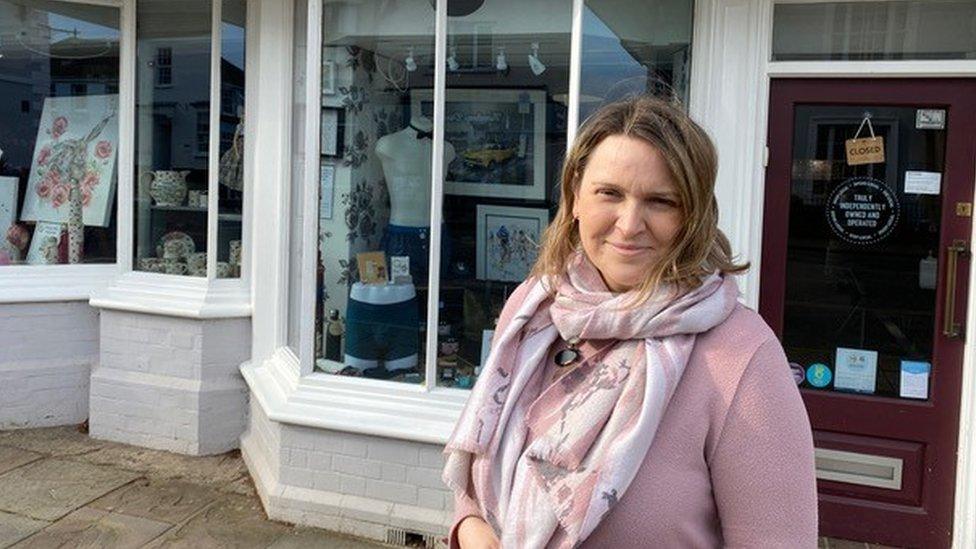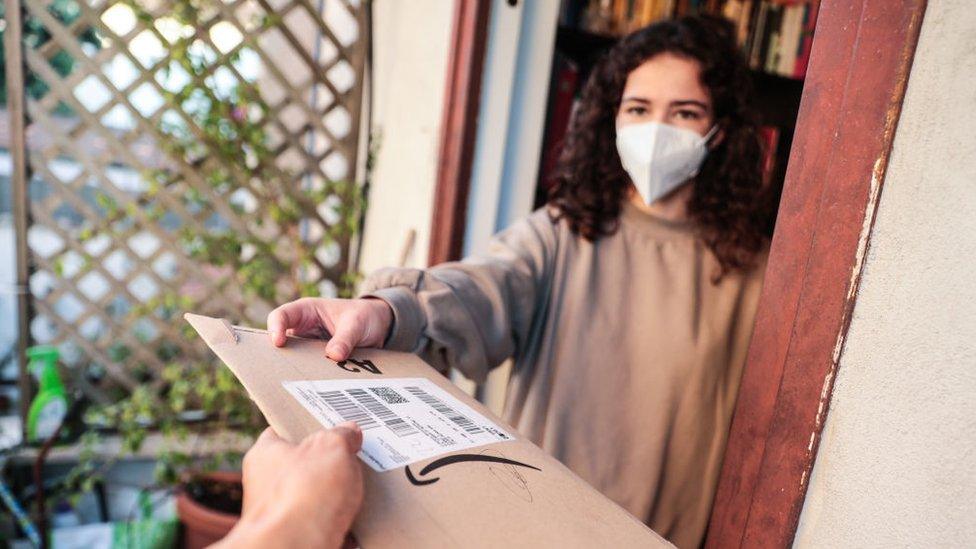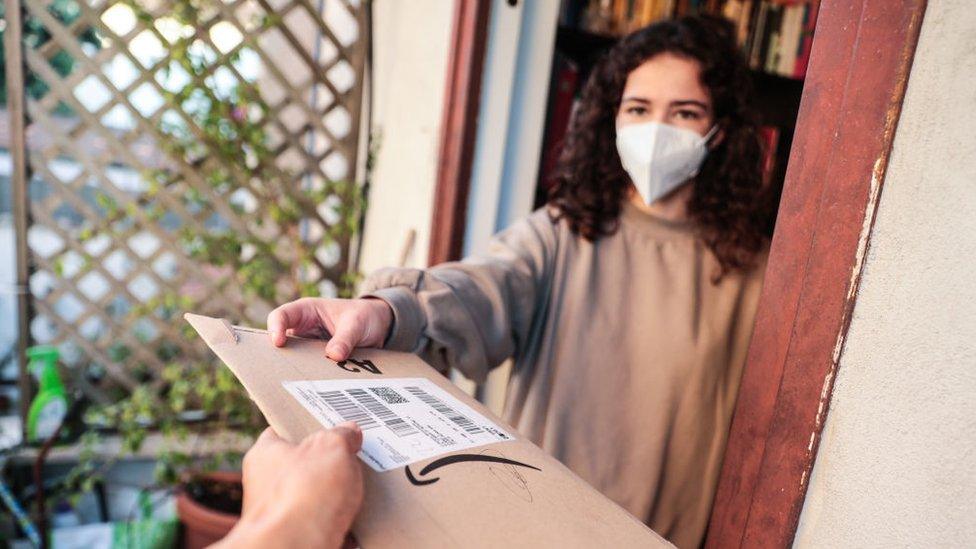Budget 2021: 'If I have to pay £13,000, it will destroy my shop'
- Published

Tabi Marsh, director of Papilio at Heritage in Thornbury, says business rates could erase all her profits
Tabi Marsh has faced plenty of challenges running her cafe and gift shop, but the next few months could prove the last straw.
In 2015 she had just installed a state-of-the-art coffee machine, and bought in stock of toys, candles and other little home luxuries, when the chip shop next door caught fire, the blaze spread, and everything was ruined.
She spent four years battling with insurance companies and rebuilding the business. Then came the pandemic with its stop-start measures and collapse in revenues.
But it is only now, with vaccine roll-out in full swing, and the promise of reopening on the horizon, that she and her father are considering throwing in the towel.
"We've been through it," she says, "We've had conversations: at what point does it become too much and it's stupid to keep going?"
A big part of the problem is business rates.
Tabi hasn't had to pay business rates since the start of the pandemic. That payment holiday, along with furlough for workers, help with VAT, and government-backed loans and grants, have saved her business, Papilio at Heritage, from going under.
But much of this support, including the business rates holiday, is set to end in April unless the chancellor has a change of heart before the Budget on 3 March.
Rishi Sunak may decide to extend the help, which would be a lifeline, says Tabi, but better still, she suggests, he could have a look at the way rates are calculated altogether.

Online retailer Amazon has been criticised for paying lower business rates than shops
Before the pandemic more than half of Papilio's profits - around £13,000 - went to pay business rates. And that's what she'd have to start paying again, even though she doesn't expect customers to be back to their old spending and socialising habits for many months.
That's because rates are calculated based on the value of her High Street shop front in Thornbury near Bristol, not on the revenues she has coming in or her profits.
And when she sees customers browsing and checking prices on their phones in her shop, she does wonder why retailers like her are expected to shoulder so much more of the tax burden than online rivals, just because internet sellers operate out of cheaper premises like out-of-town warehouses.
"We're not saying we shouldn't be paying business rates ever," she says. "But the way they're calculated is ridiculous. It isn't a fair playing field between the High Street and online."
'Unfair system'
That is the crux of an argument being made by High Street retailers across the UK. They argue it is time for online operators, who are eating up more and more of UK retailing, to shoulder more of the tax burden. And that if they don't High Street shops will go out of business.
"Business rates is an unfair tax system widely recognised as no longer fit-for-purpose," says Andrew Goodacre, chief executive of the British Independent Retailers Association (Bira).
"Whilst an alternative is being developed, the chancellor must accept that he needs to suspend the current system to support the High Street and the economic recovery we all want to see."

Vin Vara says he can't compete with internet rivals unless something is done about business rates
Bira member Vin Vara wholeheartedly agrees. He runs The Tool Shop, a network of hardware stores across London, where property and therefore rates are especially high. But it's a network that is shrinking fast. From 12 shops in 2019, he is now down to just four outlets.
If he had to pay rates on all four from April the bill would be around £66,000, he says, and he'd struggle to do that: despite the lockdown DIY boom current sales are down by around a third.
So in just over a month from now he'll close the Paddington branch.
"At the moment we're barely profitable," says Vin. "The money I invested is gone. It's easier to cut my losses."
£30bn black hole
He says the government needs to provide at least another six months of business rates relief to tide shop owners through the recovery.
In the longer run, many of his loyal customers will overlook higher prices in store because they value the advice from staff, and there are some hazardous items not easily available online. But he knows he can't compete with internet rivals, unless something is done about business rates.
"I pay the same rates at my Islington store as Amazon pays for a big warehouse. Where's the logic in that? They do 50 times the revenue."
He acknowledges just abolishing business rates would leave the government with a £30bn black hole that needs to be filled somehow.
Some have argued for an online sales tax, others for lower business rates on the High Street but higher rates for big warehouses and fulfilment centres.
"We need to think outside the box: how do we get the High Street back?" he argues. "We just need there to be a fair and level playing field."
According to reports, Mr Sunak is likely to extend the business rates holiday at next week's Budget but will also delay an ongoing review of the tax until autumn.
A Treasury spokesperson said: "We want to see thriving high streets, which is why we've spent tens of billions of pounds supporting shops, restaurants and cafes throughout the pandemic, including over £10bn worth of business rates relief.
"We're currently conducting a fundamental review of business rates and are considering responses to our call for evidence now."


Related topics
- Published18 February 2021

- Published22 February 2021
- Published7 February 2021
